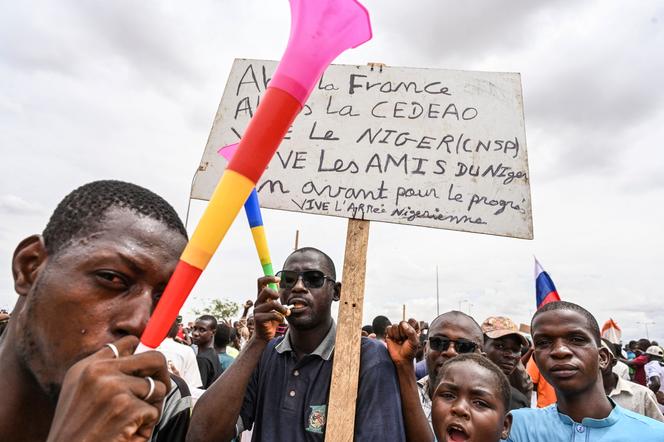


In a room at the Bourse du Travail in Bobigny, a northeastern Paris suburb, around a hundred Nigeriens gathered on Saturday, August 12, convened by the Council of Nigeriens in France (CONIF), an organization that provides support to students arriving in France. Organized at the request of many Nigeriens, the meeting provided an opportunity to debate the current political situation in their home country, following the July 26 military coup that overthrew President Mohamed Bazoum.
"We need to define action plans to help the local population," explained CONIF chairperson Adam Oumarou Aboubacar at the start of the meeting. In the preceding days, the organization had sought to define a unified position on the situation. It condemned the coup on the basis of "democratic principles" and denounced the sanctions announced by the Economic Community of West African States (ECOWAS) to put pressure on the junta, as well as the threat of military intervention by the African organization.
But this balanced position was vilified by some of those present, who viewed it as implicit support for Bazoum. While some still called for a return to the old regime, most were fatalistic − the case of a man in his thirties, who assured Le Monde that "condemning or not condemning (the coup) isn't going to change anything: the military is not going to leave." Amadou, who was following the meeting by videoconference from Toulouse, went further: "In 60 years of independence, we've had five coups. In my opinion, everything suggests that coups are part of the DNA of our system of governance."
Many participants expressed the feeling that the putsch enjoys "massive support" locally, and that this support is a form of expression of Niger's popular sovereignty. "As long as it's the people themselves who support the coup, I think we're in a democracy," said Boukari, in his thirties and wearing a suit. Hassimi, for his part, believed it was impossible to "condemn the coup, which has responded to the needs of the people." Another Nigerien assured us that "the people chose to reject the deposed regime and have came out in droves to say yes to the military junta." "We'll just have to live with it," he added.
The predominating feeling is hope, generated by the change in the country's leadership. "I've never been as proud of the people of Niger as I have over the last 14 days," said a man with tears in his eyes, who was on vacation in the country at the time of the coup. A woman with a colorful turban on her head hoped that this situation would lead to "improved political governance in Niger."
You have 45.39% of this article left to read. The rest is for subscribers only.
